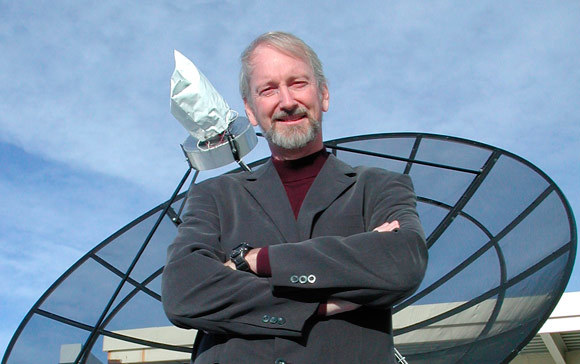SKA research leader awarded top NRF rating
28 November 2014 | Story by Newsroom
World-renowned radio astronomer Professor Russ Taylor, who holds a joint Square Kilometre Array (SKA) Research Chair at the universities of Cape Town and the Western Cape, has been awarded an A1 rating by the National Research Foundation (NRF).
"An A1 rating is the highest possible rating in the country," says Professor Danie Visser, UCT's Deputy Vice-Chancellor with responsibility for research. "It identifies the recipient as a leading international researcher in his field. This is certainly true of Professor Taylor, who has played a prominent role in the SKA project since its inception."
The SKA is an international effort to build the world's largest radio telescope (co-located in South Africa and Australia). Taylor came to South Africa from the Department of Physics and Astronomy at the University of Calgary in Canada, where he was the founding international SKA project scientist and co-authored the first SKA science case, which detailed the scientific justification and goals.
Professor Ramesh Bharuthram, UWC's Deputy Vice-Chancellor for research, says: "This is fantastic news and great for astronomy in South Africa and UWC, where the discipline has experienced an accelerated growth in the past seven years. To have a person of Russ Taylor's caliber as part of our national team in addressing the SKA-related challenges is indeed a tremendous advantage."
Taylor's research focuses on the cosmic battle between the forces of magnetism and gravity, which is probably responsible for slowing the pace at which the universe uses up its gravitational energy, allowing enough time for life to arise. "My research plan is to use MeerKAT (a precursor to the SKA telescope) to measure the polarisation of radio waves and to trace the properties of magnetic fields in galaxies and intergalactic space," says Taylor. "This will give scientists a better understanding of the evolution of cosmic magnetism."
The SKA project is the most ambitious science project ever carried out on African soil, and presents the continent with significant challenges. The biggest of these is undoubtedly the amount of data the telescope will generate (eventually several petabits a second, which is 10 times the current global internet traffic): South Africa does not, as things stand, have capacity to process, store or analyse this amount of data. Taylor is therefore leading the charge to develop this capacity in a joint effort between SKA South Africa, the Department of Science and Technology, UCT, UWC and private enterprise.
There is likely to be a limited window of opportunity to establish national leadership in data-intensive research and a global presence in this emerging field. "If we don't develop the capacity to deal with it," says Taylor, "we will have to send the data offshore ? to a partner institution in Australia or the Global North ? and will lose ownership of our data.
Visser believes that Taylor's leadership will help South Africa grasp this opportunity: "If we do so," Visser says, "we can make a difference in the country and to science around the world: solving Africa's issues, but also making Africa part of the global solutions."
Story by Carolyn Newton. Image supplied.
 This work is licensed under a Creative Commons Attribution-NoDerivatives 4.0 International License.
This work is licensed under a Creative Commons Attribution-NoDerivatives 4.0 International License.
Please view the republishing articles page for more information.










